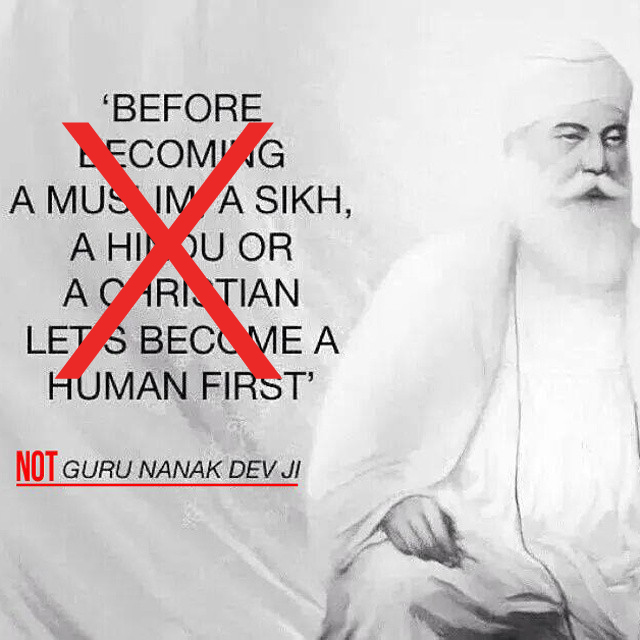An image has been shared widely by many Sikhs in the last two years purporting to present a quote by the founder of the Sikh way of life, Guru Nanak. The statement on the image reads: “Before becoming a Muslim, a Sikh, a Hindu, or a Christian, let’s become a Human first.” Not only is this not a quote that was ever uttered by Guru Nanak, but it flies in the face of the ideology he introduced and the vast body of writing that he bequeathed to mankind. On a day when Sikhs around the World celebrate Guru Nanak’s birth anniversary, how is this something that the Guru would not have agreed with and why is it that this might be so dangerous?
My first experience of this mis-attributed quote was when it was shared by a Punjabi singer, Bikram Singh on his Facebook page. It probably existed before that and certainly has been shared plenty of times since both by everyday Sikhs, as well as others who enjoy a greater social media following. I even have friends who have shared this quote, although I am relieved to say that none of my Sikh Studies students have (to my knowledge) endorsed it by doing so. The quote has been most popularly shared within an embedded, alluring image – one of those ghastly obvious attempts to capture the attention of casual browsers, thus turning them into fans/subscribers of your social media channel (as yet we haven’t gone down this road, but with a mere 2494 fans on our Facebook page how far off these marketing tactics can even we be!)
So just what is the problem with this quote? The main concern is the notion that Guru Nanak would categorise his Sikhs as a religious group of people, devoid of the true status that he imparted to them. The real author of this quote lists various religious communities and suggests that they are divisive because their members give them prominence over a universal human identity. But by including Sikhs, he/she has ignored Guru Nanak’s fundamental teaching that everything emanates from One – ੴ; how is it possible that the Guru who makes this the basis of Sikhi would then go on to teach Sikhs to become something other than that? To put it another way, if recognising the Oneness of existence (or becoming human) is at the heart of what it means to be a Sikh, then at no time would Guru Nanak advocate for Sikhs to become something else as the quote alludes by stating “Before becoming a… [Sikh]“. It is an entirely inaccurate statement!
It is argued by some that although the words were not uttered by Guru Nanak himself, they are an inference of his teachings, that they depict an ideal he would have been a fan of himself. But this shows a patent misunderstanding of not only the Sikh way of life, but the relationship between the Guru and a Sikh too. Professor Kapur Singh makes the following enlightening definition of just what a Sikh is in his immense work ‘Parasaraprasna‘ under the chapter titled ‘A Sikh and a Singh’: “The word ‘Sikh’ in its primitive sense, as well as the sense in which it is understood to mean in the Sikh scriptural writings and tradition, means an individual who values Truth above all things of the World and who dedicates his life in commitment to this Truth.” The relationship between a Sikh and their Guru is vital to the very existence of the former who is thus not simply a learner, student or disciple, but an individual who has committed their entire being to the Guru in search of Truth. This is not an identity that one adopts outside of being human – it is the essence of the human journey itself.
Sadly, most of the people sharing this quote are Sikhs and today on Guru Nanak’s Gurpurab (birth anniversary) it will do the rounds of social media again with Sikhs the chief culprits once more. Over the last year, I have raised this issue in Sikh Studies classes expressing how infuriating it can be to find ‘Sikhs’ who clearly do not understand what they are, as if they are embarrassed to define themselves as Sikh in an increasingly confused World. There may very well be a global shift away from religion, seeing it as somewhat primitive and irrelevant, but why are Sikhs presenting their way of life in that way when it is anything but? Fortunately, there has been an opposing view put across; it wasn’t until the rapper and author Humble the Poet shared a counter-image on his Facebook page that many people started to think about what the quote actually meant and the significance of its misattribution. But that doesn’t answer why Sikhs would take a statement like this that contradictingly derides their own way of life and share it without contemplating its meaning. Has our comprehension of Sikhi fallen so far? Are we now a ‘faith’, a ‘religion’, something that you do on Sunday? Arguably, yes. Today, Sikhs ‘do paath’ as if it were a chore, engaging in solemn recitation of words that can only be spoken by the privileged few, and ‘go Gurdwara’ to close their eyes in meditation, ignorant of what is being said and revealed to them. If we were instead to engage with our Guru as the relationship demands perhaps we wouldn’t fall foul of something so clearly false.
And therein is the danger in allowing this type of thinking to perpetuate – it gradually becomes accepted as the norm, going unchallenged and entering into our psyche. Like so much else in Sikhdom, it intends to ensue chaos, sending us back into the state of confusion that Guru Nanak had dispelled. We start to see the Sikh way of life as regimentary, restrictive and just another ‘faith’ in the pantheon of religions that have been, exist and are yet to come. Sant Jarnail Singh Bhindranwale repeated a statement of dual meaning which is applicable here, that until every Sikh man, woman and child did not realise that they are enslaved, their bonds of slavery could not be removed. Until we come to realise what it means to be Sikh, until we move away from this being a relationship that we are born into, we are destined not to benefit from the value of it. I can’t put it better than Humble the Poet did in his reposte of this misattributed quote when he said: “The beauty of his [Guru Nanak’s] writings, and the writings of those influenced by him, is that they deal with human nature. Talking about thoughts, feelings, emotions, and struggles keep his words timeless, and even though a giant junk of the population have fed into the idea of Sikhi being a religion of rules, regulations, uniforms, and obedience, his teachings are still there whenever people are ready to discover them for themselves.“






